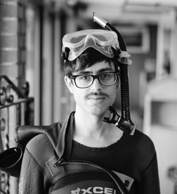STILLPOINT Archive: last updated 12/12/2013
"The world was growing exponentially larger and yet more connected at almost the same speed..."
After hour five of wearing the wetsuit, I would like very much to take a dip. The pool is inches away, and I can’t tell you how hot I am. Inside this borrowed wetsuit the sweat is constant and trapped, and I don’t think I’ve ever been this damp outside the water.
But, taking the plunge is not in the script, and so I’m having to keep up a few lies to stay focused. The main ruse is that I am Cam, a mid-20s mustachioed poolboy—a character dreamed up for one of Professor Toddy Burton’s new films. I’m expected to pretend that I am not the person that my birth certificate advertises.
I imagine most actors don’t have this struggle to suspend their identity, but given that I received a terminal degree in the art of writing nonfiction/memoir, the leap is taking more for me than just growing a mustache and donning a wetsuit.
My struggle is not that I lack imagination, but that during grad school, I lost my faith in fiction. The way I saw it, the world was growing exponentially larger and yet more connected at almost the same speed, and we were at risk of losing the opportunities to catch and interpret the experiences. Human stories were happening with the gushing power of a wrenched fire hydrant, and therefore making up
a story seemed akin to standing in the midst of the tunneling flow and claiming to be thirsty.
But it wasn’t long before issues arose within my own nonfiction camp, challenging the concept of the “actually true” story. To a journalist, the best nonfiction stories are 100 percent fact-checked and scouts-honor true.
But other nonfiction writers say that memory is fallible, and therefore the basic assumptions about our own histories may be dubious, and at times, completely fabricated. “I don’t write about what I know,” the memoirist (and novelist) Patricia Hampl writes. “I write to discover what I know.” A break from the tyranny of fact is freeing to many.
In order to write truthfully about his life, the essayist Philip Lopate tells himself that he is not a nice guy. This way, he does not worry about ruffling feathers, and can instead focus on what needs to be said. He “lies” to himself, and somehow arrives at a truer distillation of his experience.
Essayist Kyoko Mori puts it this way: “Once I discovered you could arrive at the truth obliquely, I was never the same.” Meaning, taking the side door to truth is not a sign of moral
and spiritual torpor. In fact, it’s hardly the easy way out. At a recent poetry reading, the former U.S. poet laureate Charles Simic introduced one poem as something that was 10 years in the making. “The information came quickly,” he said, “but the poem took much, much longer.”
Prior to shooting the climactic scene of the movie, I stand off camera waiting for my cue. The hood of the wetsuit cuts my hearing ability in half, and through my fogged-up goggles the floor tiles blur indiscernibly into the edges of the water. I hardly know where I am, let alone where Cam is supposed to be, and what he is supposed to say in order to achieve the results that our director is aiming for.
I don’t know why I am doing any of this, but I give myself to the temporary lie so that Professor Burton can use it to craft a permanent truth.
At times I struggle with being asked what I was thinking when I selected the box that registered me an English major. I have even fewer concrete answers when someone asks me to defend the liberal arts. Because here’s the truth: The liberal arts do not offer the truth.
They do, however, teach you to discover it.
Bryan Parys '04 is the senior writer for the Admissions office and teaches writing at Gordon College.
[email protected]
